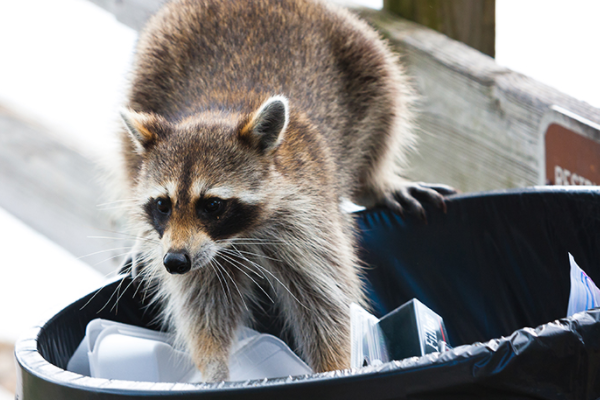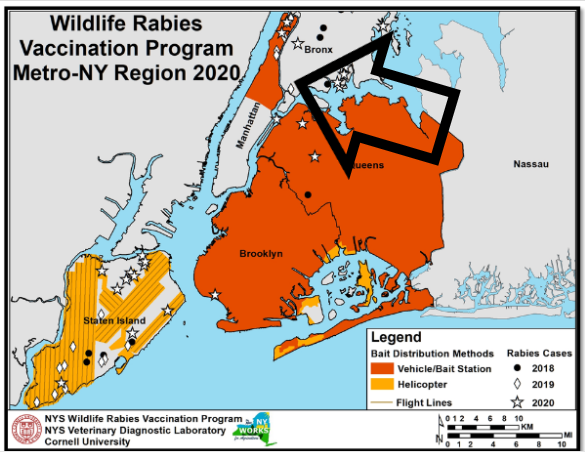
The Health Department, along with City agencies, federal and academic partners, is launching an effort to vaccinate raccoons against rabies in New York City.
“Rabies is serious and can be deadly for both you and your pets,” said Health Commissioner Dave A. Chokshi. “This effort will help residents, their pets and wildlife stay safe. New Yorkers should vaccinate their pets and watch them when outdoors. Also, it’s a good idea to keep a safe distance from wildlife.”
On Tuesday, September 29 through Friday, October 9, 2020, wildlife biologists with the United States Department of Agriculture (USDA) will distribute individual baits containing an oral rabies vaccine, using bait stations or hand tossing, in areas with thick vegetation in Brooklyn, Queens, and upper Manhattan. The Health Department will also fly a helicopter at low altitudes to deploy vaccine in Staten Island’s wooded and marshy areas, and the Gateway National Recreation Area in Brooklyn and Queens.
“We want to remind New Yorkers to keep a safe distance from raccoons and respect their space – never approach or try to feed them. We’re grateful to the Department of Health and USDA for their continued partnership and effort to sustain healthier wildlife in our parks.”
“Rabies is a serious illness that poses danger to the entire community. This preventative measure will help maintain the health and safety of all New Yorkers, both human and animal,” said NYC Parks Wildlife Unit Director Richard Simon. “We want to remind New Yorkers to keep a safe distance from raccoons and respect their space – never approach or try to feed them. We’re grateful to the Department of Health and USDA for their continued partnership and effort to sustain healthier wildlife in our parks.”
This vaccination program, started by Cornell University in 2014, has occurred every year in Brooklyn, Queens and Staten Island, except for 2019. This year’s effort will include upper Manhattan to continue the Department’s targeted vaccination efforts from last year in response to isolated rabies outbreaks in Manhattan.
“We’ve lost some ground because of recent budgetary constraints; however, it’s wonderful to be on track again,” said Cornell University’s Program Coordinator Dr. Laura L. Bigler. “Vaccination of NY City’s wildlife also supports the national strategy to eliminate raccoon rabies with the cooperation of affected states.”
The small, brown-colored baits are fish-scented and resemble a ketchup packet which conceals a small amount of pink, liquid vaccine. Raccoons are attracted to the odor, and when raccoons chew the bait, they can become immunized which protects them against infection with rabies.
Thirty animals have been found to have rabies across the five boroughs to date in 2020: 8 raccoons, 1 skunk, and 1 cat from the Bronx, 12 raccoons, 1 cat, and 1 bat from Staten Island, 2 raccoons and 1 cat from Queens, 1 raccoon from Brooklyn, and 2 raccoons from upper Manhattan.
Thirty animals have been found to have rabies across the five boroughs to date in 2020: 8 raccoons, 1 skunk, and 1 cat from the Bronx, 12 raccoons, 1 cat, and 1 bat from Staten Island, 2 raccoons and 1 cat from Queens, 1 raccoon from Brooklyn, and 2 raccoons from upper Manhattan.
The bait itself does not harm people, but in extremely rare instances, exposure to the liquid may cause a rash. In the unlikely event someone comes in contact with the liquid, they should wash hands with warm, soapy water, talk to their doctor, and notify the Poison Control Center at 1-800-222-1222. The bait is not harmful to pets and cannot cause rabies, but it can cause vomiting if several baits are consumed. If pets find the bait, do not try to take it away from them to avoid being bitten and exposed to the vaccine.
Areas to be baited
Rabies is a fatal but preventable viral disease. It can spread to people and pets if they are bitten by a rabid animal. In NYC, rabies is mostly found in raccoons. The rabies virus infects the central nervous system. If a person or pet does not receive the appropriate medical care after a potential rabies exposure, the virus can cause disease in the brain, ultimately resulting in death. Rabies can be prevented by vaccinating pets, staying away from wildlife, and seeking medical care after potential exposures before symptoms start.
Raccoons
- Raccoons live in New York City and if seen during the day be cautious but not alarmed. Being out during the day does not mean it is rabid, it may just be looking for food.
- Do not feed raccoons.
- Observe raccoons from a distance.
- Vaccinate your pets, make sure their vaccinations are up to date and keep them leashed.
- For more information about raccoons, visit Wildlife NYC.
To protect yourself against rabies
- Do not touch or feed wild animals, stray dogs or cats.
- Keep garbage in tightly sealed containers.
- Stay away from any animal that is behaving aggressively.
- Stay away from any wild animal that appears ill or acts unusually friendly. Call 311 to report a sick animal.
- Animals that have attacked, or seem likely to attack, should be reported to 911.
- Do not try to separate animals that are fighting.
To protect your pet against rabies
- Keep your dog leashed while outdoors.
- Do not leave your pets outdoors unattended.
- If your pet has been in contact with an animal that might be rabid, contact your veterinarian immediately and report the incident to 311.
- Feed pets indoors.
If you are bitten or scratched by an animal
- Immediately wash the wound with lots of soap and water.
- Seek medical care from your health care provider.
- If the animal is not owned and can be captured, call 311.
- If the animal is a pet, get the owner’s name, address, and telephone number so the Health Department can monitor the animal.
- To report a bite, call the Animal Bite Unit (212-676-2483) between 9 a.m. and 5 p.m. during the week. At night or on weekends, call 212-POISONS (764-7667).
- For information about medical follow-up, call 311, or your medical provider.
For more information about rabies in New York City, visit www.nyc.gov/health/rabies.
For more information on the Oral Rabies Vaccine, please visit the following sites:
New York State Department of Health here
United States Department of Agriculture Animal and Plant Health Inspection Service, National Rabies Management Program: http://tinyurl.com/usda-rabies
Photo credit: NYC via source.
Become a Harlem Insider!
By submitting this form, you are consenting to receive marketing emails from: . You can revoke your consent to receive emails at any time by using the SafeUnsubscribe® link, found at the bottom of every email. Emails are serviced by Constant Contact









